Sports Psychology: Analysis of 'The Fighter' Movie Report
VerifiedAdded on 2020/06/06
|11
|2840
|74
Report
AI Summary
This report provides a comprehensive analysis of sports psychology concepts as depicted in the movie "The Fighter." It explores key themes such as personality traits, including agility, balance, coordination, power, and reaction time, and their influence on athletic performance. The report delves into arousal and anxiety, examining theories like the Drive Theory, Inverted U hypothesis, Multidimensional Anxiety Theory, and Catastrophe Model, and their impact on the psychological state of athletes. Furthermore, it investigates the role of motivation, discussing how it affects performance and the challenges faced by athletes, as seen in the experiences of Micky Ward and Dicky Eklund. The report concludes by highlighting the interconnectedness of these psychological factors and their significance in the context of sports and human behavior.

Assignment 2
Report
Report
Paraphrase This Document
Need a fresh take? Get an instant paraphrase of this document with our AI Paraphraser
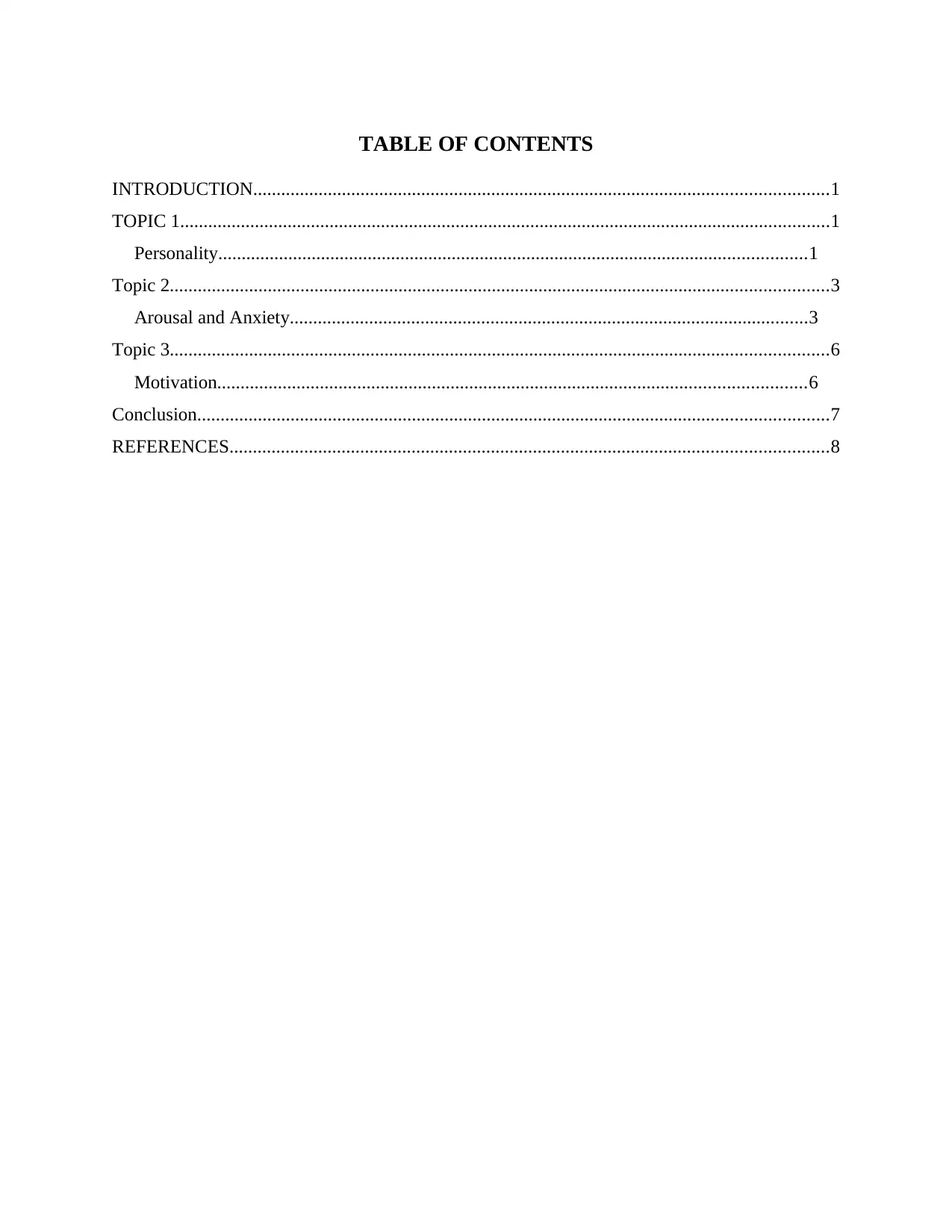
TABLE OF CONTENTS
INTRODUCTION...........................................................................................................................1
TOPIC 1...........................................................................................................................................1
Personality..............................................................................................................................1
Topic 2.............................................................................................................................................3
Arousal and Anxiety...............................................................................................................3
Topic 3.............................................................................................................................................6
Motivation..............................................................................................................................6
Conclusion.......................................................................................................................................7
REFERENCES................................................................................................................................8
INTRODUCTION...........................................................................................................................1
TOPIC 1...........................................................................................................................................1
Personality..............................................................................................................................1
Topic 2.............................................................................................................................................3
Arousal and Anxiety...............................................................................................................3
Topic 3.............................................................................................................................................6
Motivation..............................................................................................................................6
Conclusion.......................................................................................................................................7
REFERENCES................................................................................................................................8
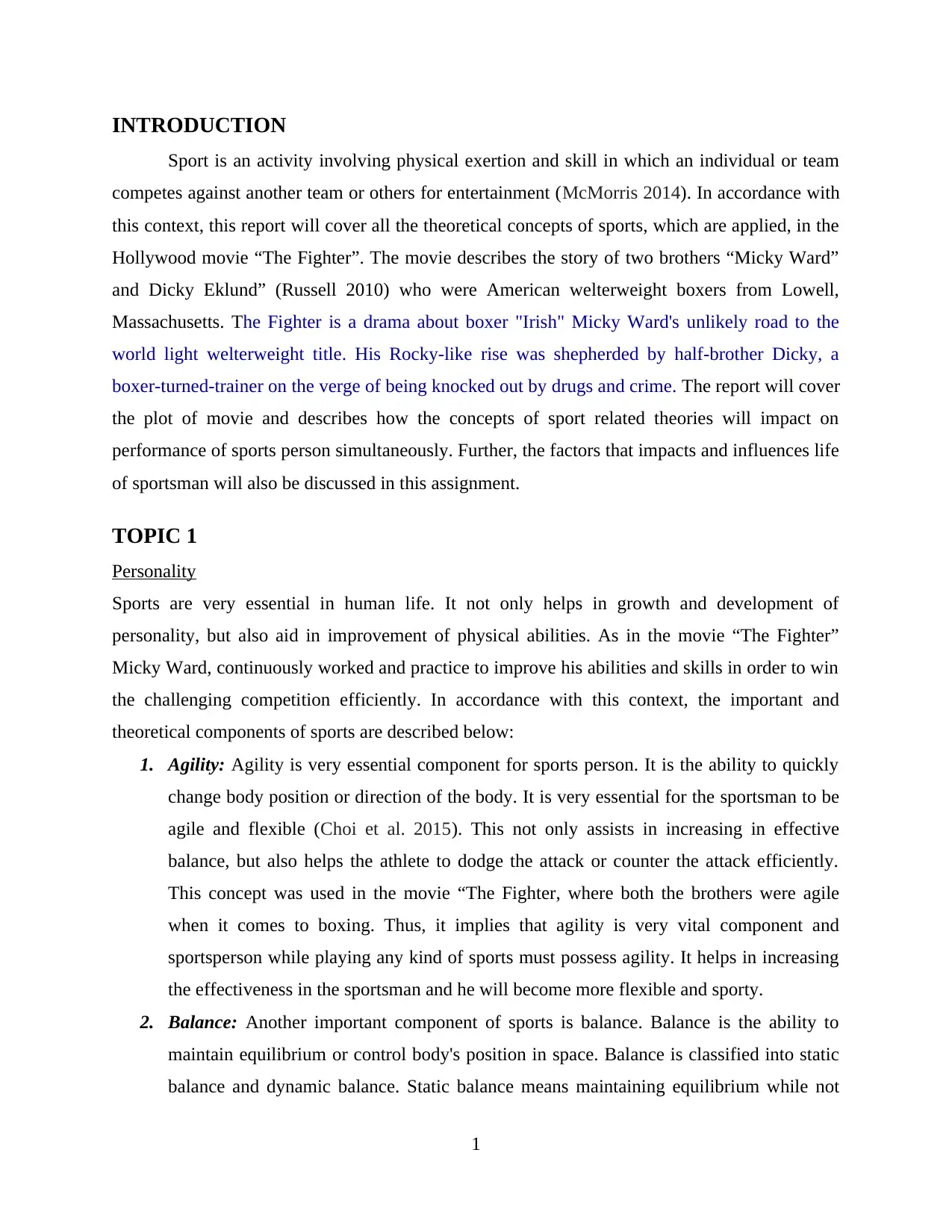
INTRODUCTION
Sport is an activity involving physical exertion and skill in which an individual or team
competes against another team or others for entertainment (McMorris 2014). In accordance with
this context, this report will cover all the theoretical concepts of sports, which are applied, in the
Hollywood movie “The Fighter”. The movie describes the story of two brothers “Micky Ward”
and Dicky Eklund” (Russell 2010) who were American welterweight boxers from Lowell,
Massachusetts. The Fighter is a drama about boxer "Irish" Micky Ward's unlikely road to the
world light welterweight title. His Rocky-like rise was shepherded by half-brother Dicky, a
boxer-turned-trainer on the verge of being knocked out by drugs and crime. The report will cover
the plot of movie and describes how the concepts of sport related theories will impact on
performance of sports person simultaneously. Further, the factors that impacts and influences life
of sportsman will also be discussed in this assignment.
TOPIC 1
Personality
Sports are very essential in human life. It not only helps in growth and development of
personality, but also aid in improvement of physical abilities. As in the movie “The Fighter”
Micky Ward, continuously worked and practice to improve his abilities and skills in order to win
the challenging competition efficiently. In accordance with this context, the important and
theoretical components of sports are described below:
1. Agility: Agility is very essential component for sports person. It is the ability to quickly
change body position or direction of the body. It is very essential for the sportsman to be
agile and flexible (Choi et al. 2015). This not only assists in increasing in effective
balance, but also helps the athlete to dodge the attack or counter the attack efficiently.
This concept was used in the movie “The Fighter, where both the brothers were agile
when it comes to boxing. Thus, it implies that agility is very vital component and
sportsperson while playing any kind of sports must possess agility. It helps in increasing
the effectiveness in the sportsman and he will become more flexible and sporty.
2. Balance: Another important component of sports is balance. Balance is the ability to
maintain equilibrium or control body's position in space. Balance is classified into static
balance and dynamic balance. Static balance means maintaining equilibrium while not
1
Sport is an activity involving physical exertion and skill in which an individual or team
competes against another team or others for entertainment (McMorris 2014). In accordance with
this context, this report will cover all the theoretical concepts of sports, which are applied, in the
Hollywood movie “The Fighter”. The movie describes the story of two brothers “Micky Ward”
and Dicky Eklund” (Russell 2010) who were American welterweight boxers from Lowell,
Massachusetts. The Fighter is a drama about boxer "Irish" Micky Ward's unlikely road to the
world light welterweight title. His Rocky-like rise was shepherded by half-brother Dicky, a
boxer-turned-trainer on the verge of being knocked out by drugs and crime. The report will cover
the plot of movie and describes how the concepts of sport related theories will impact on
performance of sports person simultaneously. Further, the factors that impacts and influences life
of sportsman will also be discussed in this assignment.
TOPIC 1
Personality
Sports are very essential in human life. It not only helps in growth and development of
personality, but also aid in improvement of physical abilities. As in the movie “The Fighter”
Micky Ward, continuously worked and practice to improve his abilities and skills in order to win
the challenging competition efficiently. In accordance with this context, the important and
theoretical components of sports are described below:
1. Agility: Agility is very essential component for sports person. It is the ability to quickly
change body position or direction of the body. It is very essential for the sportsman to be
agile and flexible (Choi et al. 2015). This not only assists in increasing in effective
balance, but also helps the athlete to dodge the attack or counter the attack efficiently.
This concept was used in the movie “The Fighter, where both the brothers were agile
when it comes to boxing. Thus, it implies that agility is very vital component and
sportsperson while playing any kind of sports must possess agility. It helps in increasing
the effectiveness in the sportsman and he will become more flexible and sporty.
2. Balance: Another important component of sports is balance. Balance is the ability to
maintain equilibrium or control body's position in space. Balance is classified into static
balance and dynamic balance. Static balance means maintaining equilibrium while not
1
⊘ This is a preview!⊘
Do you want full access?
Subscribe today to unlock all pages.

Trusted by 1+ million students worldwide
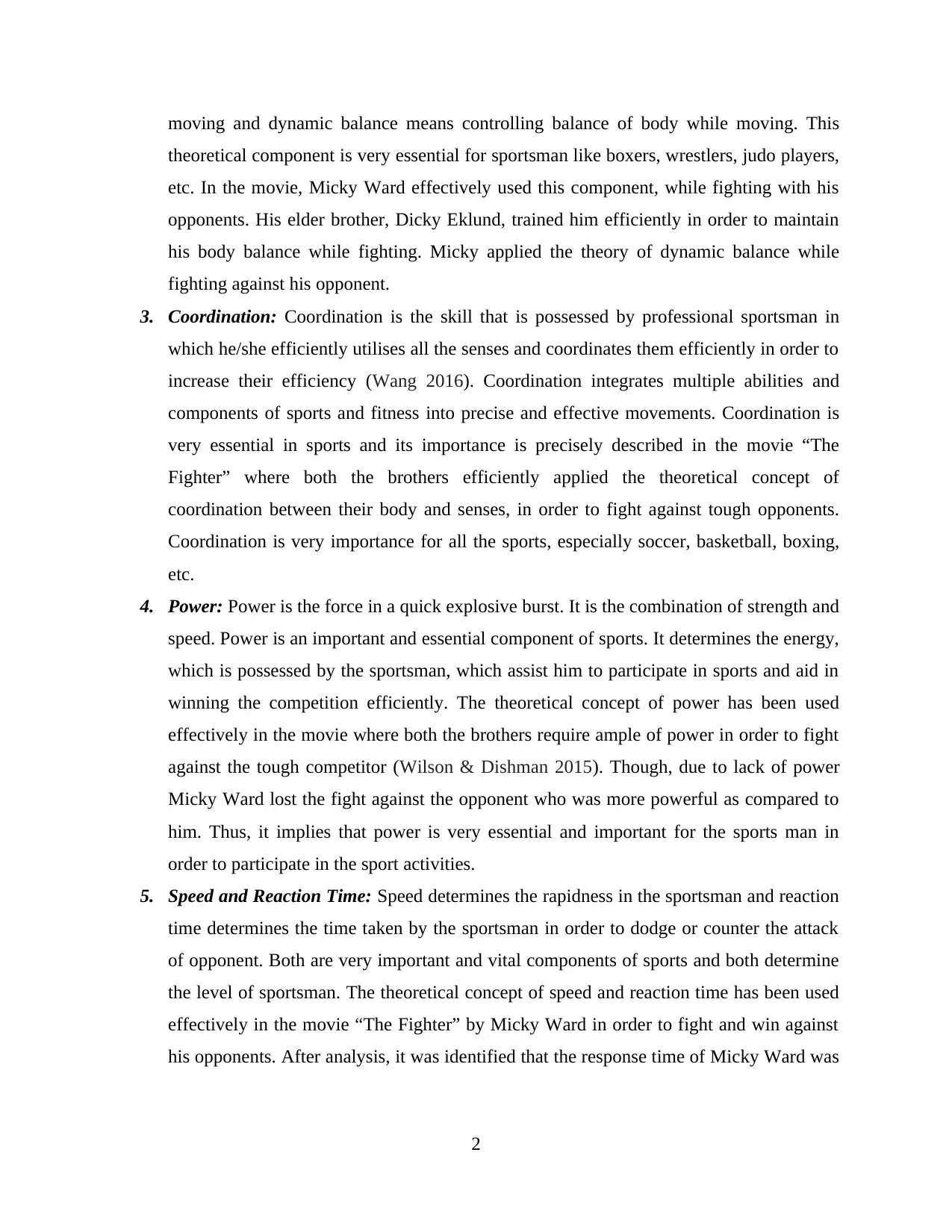
moving and dynamic balance means controlling balance of body while moving. This
theoretical component is very essential for sportsman like boxers, wrestlers, judo players,
etc. In the movie, Micky Ward effectively used this component, while fighting with his
opponents. His elder brother, Dicky Eklund, trained him efficiently in order to maintain
his body balance while fighting. Micky applied the theory of dynamic balance while
fighting against his opponent.
3. Coordination: Coordination is the skill that is possessed by professional sportsman in
which he/she efficiently utilises all the senses and coordinates them efficiently in order to
increase their efficiency (Wang 2016). Coordination integrates multiple abilities and
components of sports and fitness into precise and effective movements. Coordination is
very essential in sports and its importance is precisely described in the movie “The
Fighter” where both the brothers efficiently applied the theoretical concept of
coordination between their body and senses, in order to fight against tough opponents.
Coordination is very importance for all the sports, especially soccer, basketball, boxing,
etc.
4. Power: Power is the force in a quick explosive burst. It is the combination of strength and
speed. Power is an important and essential component of sports. It determines the energy,
which is possessed by the sportsman, which assist him to participate in sports and aid in
winning the competition efficiently. The theoretical concept of power has been used
effectively in the movie where both the brothers require ample of power in order to fight
against the tough competitor (Wilson & Dishman 2015). Though, due to lack of power
Micky Ward lost the fight against the opponent who was more powerful as compared to
him. Thus, it implies that power is very essential and important for the sports man in
order to participate in the sport activities.
5. Speed and Reaction Time: Speed determines the rapidness in the sportsman and reaction
time determines the time taken by the sportsman in order to dodge or counter the attack
of opponent. Both are very important and vital components of sports and both determine
the level of sportsman. The theoretical concept of speed and reaction time has been used
effectively in the movie “The Fighter” by Micky Ward in order to fight and win against
his opponents. After analysis, it was identified that the response time of Micky Ward was
2
theoretical component is very essential for sportsman like boxers, wrestlers, judo players,
etc. In the movie, Micky Ward effectively used this component, while fighting with his
opponents. His elder brother, Dicky Eklund, trained him efficiently in order to maintain
his body balance while fighting. Micky applied the theory of dynamic balance while
fighting against his opponent.
3. Coordination: Coordination is the skill that is possessed by professional sportsman in
which he/she efficiently utilises all the senses and coordinates them efficiently in order to
increase their efficiency (Wang 2016). Coordination integrates multiple abilities and
components of sports and fitness into precise and effective movements. Coordination is
very essential in sports and its importance is precisely described in the movie “The
Fighter” where both the brothers efficiently applied the theoretical concept of
coordination between their body and senses, in order to fight against tough opponents.
Coordination is very importance for all the sports, especially soccer, basketball, boxing,
etc.
4. Power: Power is the force in a quick explosive burst. It is the combination of strength and
speed. Power is an important and essential component of sports. It determines the energy,
which is possessed by the sportsman, which assist him to participate in sports and aid in
winning the competition efficiently. The theoretical concept of power has been used
effectively in the movie where both the brothers require ample of power in order to fight
against the tough competitor (Wilson & Dishman 2015). Though, due to lack of power
Micky Ward lost the fight against the opponent who was more powerful as compared to
him. Thus, it implies that power is very essential and important for the sports man in
order to participate in the sport activities.
5. Speed and Reaction Time: Speed determines the rapidness in the sportsman and reaction
time determines the time taken by the sportsman in order to dodge or counter the attack
of opponent. Both are very important and vital components of sports and both determine
the level of sportsman. The theoretical concept of speed and reaction time has been used
effectively in the movie “The Fighter” by Micky Ward in order to fight and win against
his opponents. After analysis, it was identified that the response time of Micky Ward was
2
Paraphrase This Document
Need a fresh take? Get an instant paraphrase of this document with our AI Paraphraser
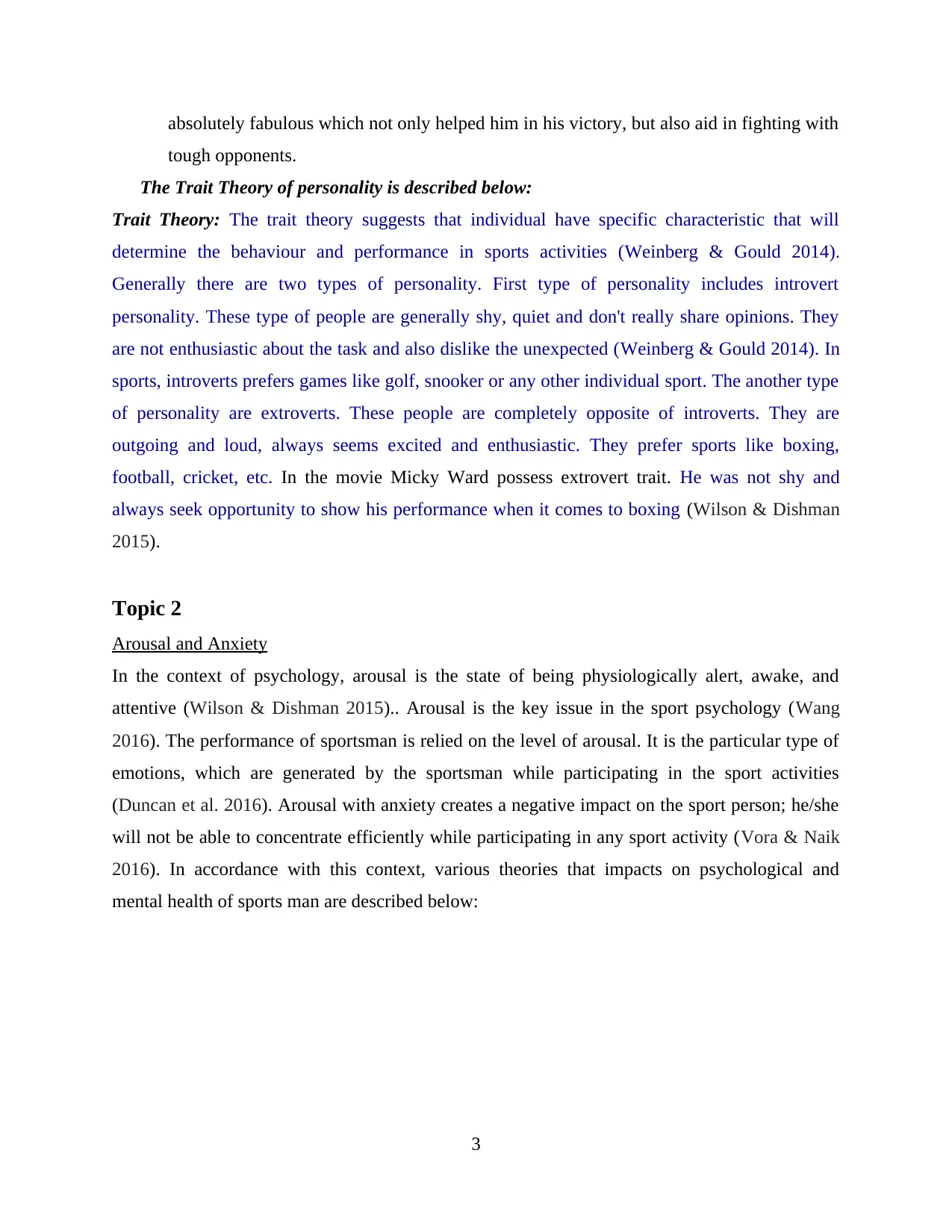
absolutely fabulous which not only helped him in his victory, but also aid in fighting with
tough opponents.
The Trait Theory of personality is described below:
Trait Theory: The trait theory suggests that individual have specific characteristic that will
determine the behaviour and performance in sports activities (Weinberg & Gould 2014).
Generally there are two types of personality. First type of personality includes introvert
personality. These type of people are generally shy, quiet and don't really share opinions. They
are not enthusiastic about the task and also dislike the unexpected (Weinberg & Gould 2014). In
sports, introverts prefers games like golf, snooker or any other individual sport. The another type
of personality are extroverts. These people are completely opposite of introverts. They are
outgoing and loud, always seems excited and enthusiastic. They prefer sports like boxing,
football, cricket, etc. In the movie Micky Ward possess extrovert trait. He was not shy and
always seek opportunity to show his performance when it comes to boxing (Wilson & Dishman
2015).
Topic 2
Arousal and Anxiety
In the context of psychology, arousal is the state of being physiologically alert, awake, and
attentive (Wilson & Dishman 2015).. Arousal is the key issue in the sport psychology (Wang
2016). The performance of sportsman is relied on the level of arousal. It is the particular type of
emotions, which are generated by the sportsman while participating in the sport activities
(Duncan et al. 2016). Arousal with anxiety creates a negative impact on the sport person; he/she
will not be able to concentrate efficiently while participating in any sport activity (Vora & Naik
2016). In accordance with this context, various theories that impacts on psychological and
mental health of sports man are described below:
3
tough opponents.
The Trait Theory of personality is described below:
Trait Theory: The trait theory suggests that individual have specific characteristic that will
determine the behaviour and performance in sports activities (Weinberg & Gould 2014).
Generally there are two types of personality. First type of personality includes introvert
personality. These type of people are generally shy, quiet and don't really share opinions. They
are not enthusiastic about the task and also dislike the unexpected (Weinberg & Gould 2014). In
sports, introverts prefers games like golf, snooker or any other individual sport. The another type
of personality are extroverts. These people are completely opposite of introverts. They are
outgoing and loud, always seems excited and enthusiastic. They prefer sports like boxing,
football, cricket, etc. In the movie Micky Ward possess extrovert trait. He was not shy and
always seek opportunity to show his performance when it comes to boxing (Wilson & Dishman
2015).
Topic 2
Arousal and Anxiety
In the context of psychology, arousal is the state of being physiologically alert, awake, and
attentive (Wilson & Dishman 2015).. Arousal is the key issue in the sport psychology (Wang
2016). The performance of sportsman is relied on the level of arousal. It is the particular type of
emotions, which are generated by the sportsman while participating in the sport activities
(Duncan et al. 2016). Arousal with anxiety creates a negative impact on the sport person; he/she
will not be able to concentrate efficiently while participating in any sport activity (Vora & Naik
2016). In accordance with this context, various theories that impacts on psychological and
mental health of sports man are described below:
3
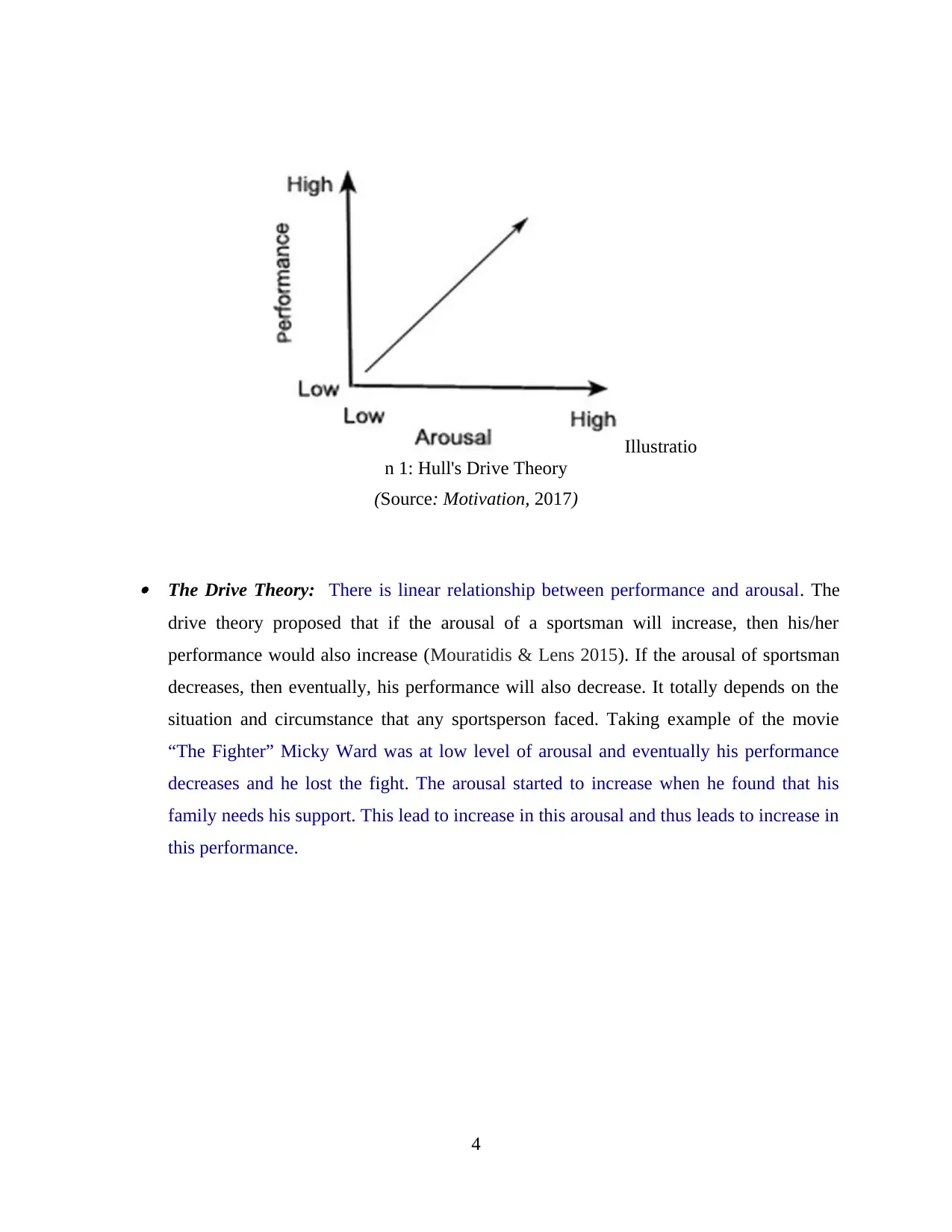
The Drive Theory: There is linear relationship between performance and arousal. The
drive theory proposed that if the arousal of a sportsman will increase, then his/her
performance would also increase (Mouratidis & Lens 2015). If the arousal of sportsman
decreases, then eventually, his performance will also decrease. It totally depends on the
situation and circumstance that any sportsperson faced. Taking example of the movie
“The Fighter” Micky Ward was at low level of arousal and eventually his performance
decreases and he lost the fight. The arousal started to increase when he found that his
family needs his support. This lead to increase in this arousal and thus leads to increase in
this performance.
4
Illustratio
n 1: Hull's Drive Theory
(Source: Motivation, 2017)
drive theory proposed that if the arousal of a sportsman will increase, then his/her
performance would also increase (Mouratidis & Lens 2015). If the arousal of sportsman
decreases, then eventually, his performance will also decrease. It totally depends on the
situation and circumstance that any sportsperson faced. Taking example of the movie
“The Fighter” Micky Ward was at low level of arousal and eventually his performance
decreases and he lost the fight. The arousal started to increase when he found that his
family needs his support. This lead to increase in this arousal and thus leads to increase in
this performance.
4
Illustratio
n 1: Hull's Drive Theory
(Source: Motivation, 2017)
⊘ This is a preview!⊘
Do you want full access?
Subscribe today to unlock all pages.

Trusted by 1+ million students worldwide
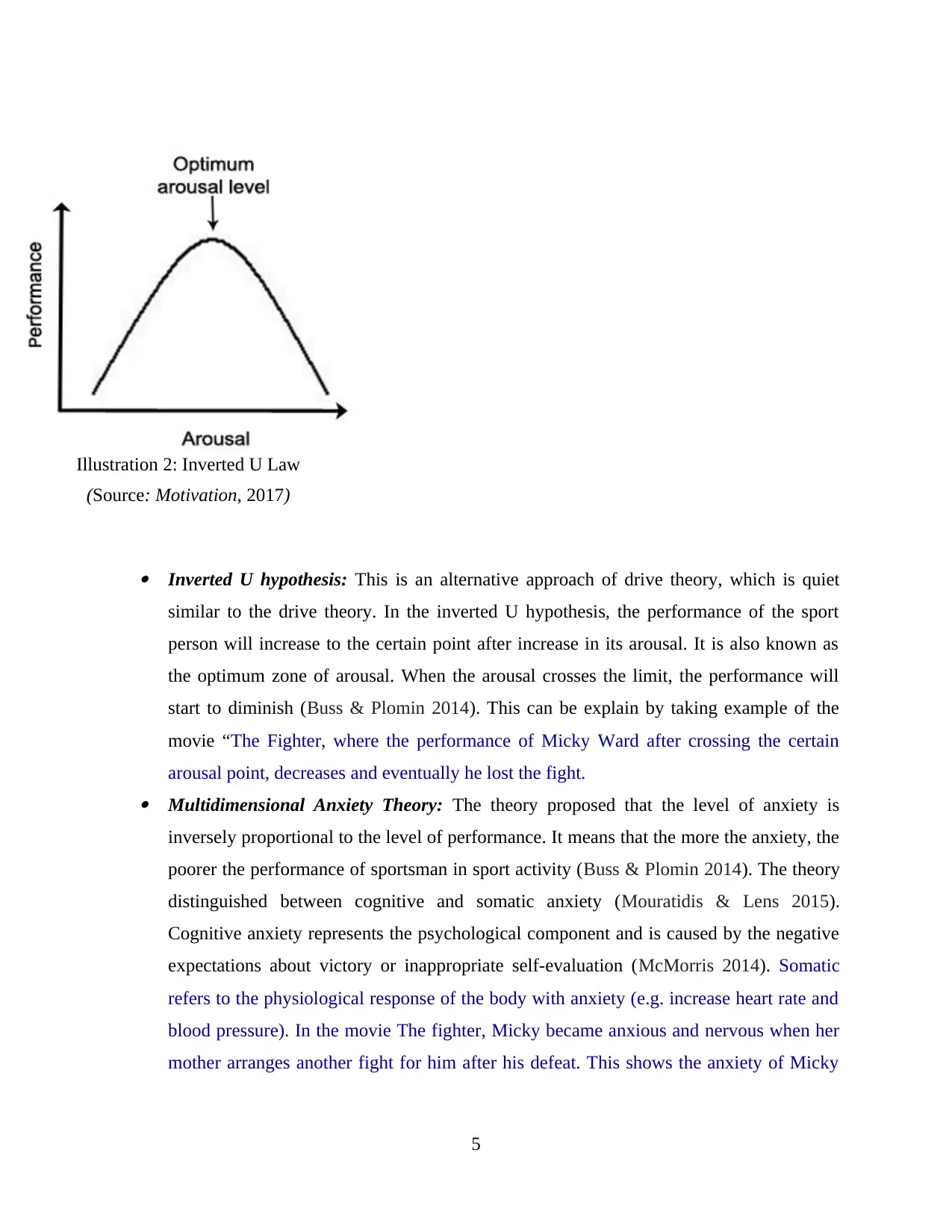
Inverted U hypothesis: This is an alternative approach of drive theory, which is quiet
similar to the drive theory. In the inverted U hypothesis, the performance of the sport
person will increase to the certain point after increase in its arousal. It is also known as
the optimum zone of arousal. When the arousal crosses the limit, the performance will
start to diminish (Buss & Plomin 2014). This can be explain by taking example of the
movie “The Fighter, where the performance of Micky Ward after crossing the certain
arousal point, decreases and eventually he lost the fight. Multidimensional Anxiety Theory: The theory proposed that the level of anxiety is
inversely proportional to the level of performance. It means that the more the anxiety, the
poorer the performance of sportsman in sport activity (Buss & Plomin 2014). The theory
distinguished between cognitive and somatic anxiety (Mouratidis & Lens 2015).
Cognitive anxiety represents the psychological component and is caused by the negative
expectations about victory or inappropriate self-evaluation (McMorris 2014). Somatic
refers to the physiological response of the body with anxiety (e.g. increase heart rate and
blood pressure). In the movie The fighter, Micky became anxious and nervous when her
mother arranges another fight for him after his defeat. This shows the anxiety of Micky
5
Illustration 2: Inverted U Law
(Source: Motivation, 2017)
similar to the drive theory. In the inverted U hypothesis, the performance of the sport
person will increase to the certain point after increase in its arousal. It is also known as
the optimum zone of arousal. When the arousal crosses the limit, the performance will
start to diminish (Buss & Plomin 2014). This can be explain by taking example of the
movie “The Fighter, where the performance of Micky Ward after crossing the certain
arousal point, decreases and eventually he lost the fight. Multidimensional Anxiety Theory: The theory proposed that the level of anxiety is
inversely proportional to the level of performance. It means that the more the anxiety, the
poorer the performance of sportsman in sport activity (Buss & Plomin 2014). The theory
distinguished between cognitive and somatic anxiety (Mouratidis & Lens 2015).
Cognitive anxiety represents the psychological component and is caused by the negative
expectations about victory or inappropriate self-evaluation (McMorris 2014). Somatic
refers to the physiological response of the body with anxiety (e.g. increase heart rate and
blood pressure). In the movie The fighter, Micky became anxious and nervous when her
mother arranges another fight for him after his defeat. This shows the anxiety of Micky
5
Illustration 2: Inverted U Law
(Source: Motivation, 2017)
Paraphrase This Document
Need a fresh take? Get an instant paraphrase of this document with our AI Paraphraser
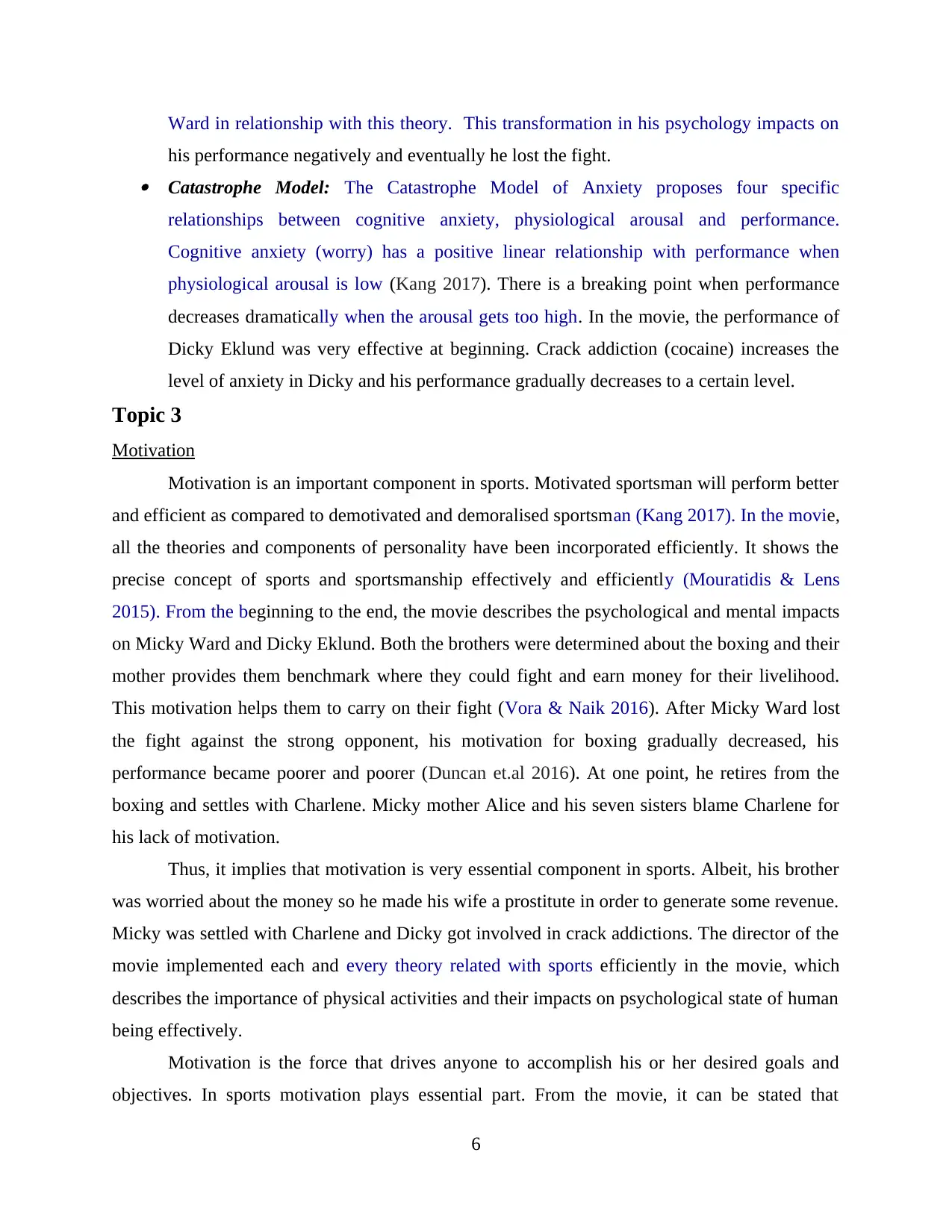
Ward in relationship with this theory. This transformation in his psychology impacts on
his performance negatively and eventually he lost the fight. Catastrophe Model: The Catastrophe Model of Anxiety proposes four specific
relationships between cognitive anxiety, physiological arousal and performance.
Cognitive anxiety (worry) has a positive linear relationship with performance when
physiological arousal is low (Kang 2017). There is a breaking point when performance
decreases dramatically when the arousal gets too high. In the movie, the performance of
Dicky Eklund was very effective at beginning. Crack addiction (cocaine) increases the
level of anxiety in Dicky and his performance gradually decreases to a certain level.
Topic 3
Motivation
Motivation is an important component in sports. Motivated sportsman will perform better
and efficient as compared to demotivated and demoralised sportsman (Kang 2017). In the movie,
all the theories and components of personality have been incorporated efficiently. It shows the
precise concept of sports and sportsmanship effectively and efficiently (Mouratidis & Lens
2015). From the beginning to the end, the movie describes the psychological and mental impacts
on Micky Ward and Dicky Eklund. Both the brothers were determined about the boxing and their
mother provides them benchmark where they could fight and earn money for their livelihood.
This motivation helps them to carry on their fight (Vora & Naik 2016). After Micky Ward lost
the fight against the strong opponent, his motivation for boxing gradually decreased, his
performance became poorer and poorer (Duncan et.al 2016). At one point, he retires from the
boxing and settles with Charlene. Micky mother Alice and his seven sisters blame Charlene for
his lack of motivation.
Thus, it implies that motivation is very essential component in sports. Albeit, his brother
was worried about the money so he made his wife a prostitute in order to generate some revenue.
Micky was settled with Charlene and Dicky got involved in crack addictions. The director of the
movie implemented each and every theory related with sports efficiently in the movie, which
describes the importance of physical activities and their impacts on psychological state of human
being effectively.
Motivation is the force that drives anyone to accomplish his or her desired goals and
objectives. In sports motivation plays essential part. From the movie, it can be stated that
6
his performance negatively and eventually he lost the fight. Catastrophe Model: The Catastrophe Model of Anxiety proposes four specific
relationships between cognitive anxiety, physiological arousal and performance.
Cognitive anxiety (worry) has a positive linear relationship with performance when
physiological arousal is low (Kang 2017). There is a breaking point when performance
decreases dramatically when the arousal gets too high. In the movie, the performance of
Dicky Eklund was very effective at beginning. Crack addiction (cocaine) increases the
level of anxiety in Dicky and his performance gradually decreases to a certain level.
Topic 3
Motivation
Motivation is an important component in sports. Motivated sportsman will perform better
and efficient as compared to demotivated and demoralised sportsman (Kang 2017). In the movie,
all the theories and components of personality have been incorporated efficiently. It shows the
precise concept of sports and sportsmanship effectively and efficiently (Mouratidis & Lens
2015). From the beginning to the end, the movie describes the psychological and mental impacts
on Micky Ward and Dicky Eklund. Both the brothers were determined about the boxing and their
mother provides them benchmark where they could fight and earn money for their livelihood.
This motivation helps them to carry on their fight (Vora & Naik 2016). After Micky Ward lost
the fight against the strong opponent, his motivation for boxing gradually decreased, his
performance became poorer and poorer (Duncan et.al 2016). At one point, he retires from the
boxing and settles with Charlene. Micky mother Alice and his seven sisters blame Charlene for
his lack of motivation.
Thus, it implies that motivation is very essential component in sports. Albeit, his brother
was worried about the money so he made his wife a prostitute in order to generate some revenue.
Micky was settled with Charlene and Dicky got involved in crack addictions. The director of the
movie implemented each and every theory related with sports efficiently in the movie, which
describes the importance of physical activities and their impacts on psychological state of human
being effectively.
Motivation is the force that drives anyone to accomplish his or her desired goals and
objectives. In sports motivation plays essential part. From the movie, it can be stated that
6
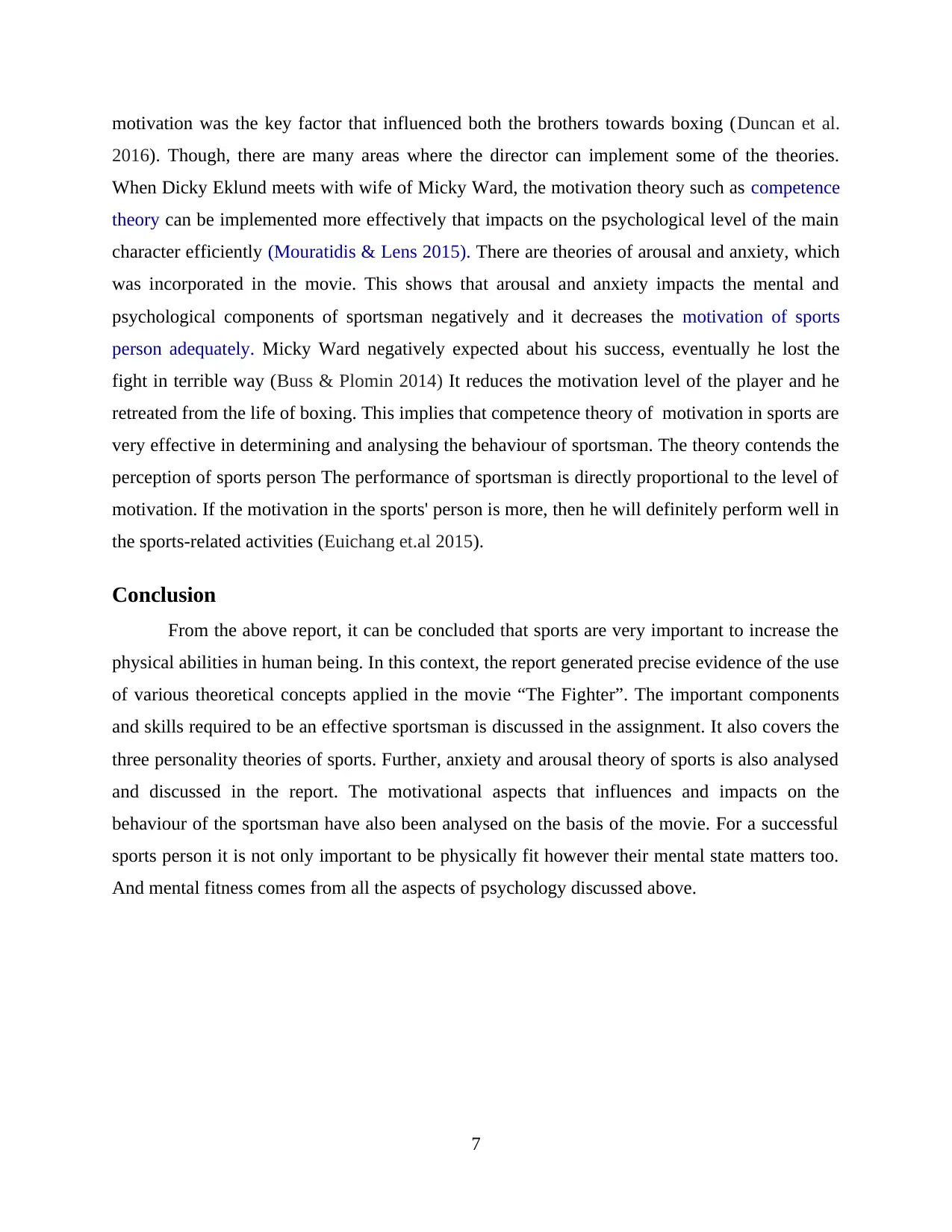
motivation was the key factor that influenced both the brothers towards boxing (Duncan et al.
2016). Though, there are many areas where the director can implement some of the theories.
When Dicky Eklund meets with wife of Micky Ward, the motivation theory such as competence
theory can be implemented more effectively that impacts on the psychological level of the main
character efficiently (Mouratidis & Lens 2015). There are theories of arousal and anxiety, which
was incorporated in the movie. This shows that arousal and anxiety impacts the mental and
psychological components of sportsman negatively and it decreases the motivation of sports
person adequately. Micky Ward negatively expected about his success, eventually he lost the
fight in terrible way (Buss & Plomin 2014) It reduces the motivation level of the player and he
retreated from the life of boxing. This implies that competence theory of motivation in sports are
very effective in determining and analysing the behaviour of sportsman. The theory contends the
perception of sports person The performance of sportsman is directly proportional to the level of
motivation. If the motivation in the sports' person is more, then he will definitely perform well in
the sports-related activities (Euichang et.al 2015).
Conclusion
From the above report, it can be concluded that sports are very important to increase the
physical abilities in human being. In this context, the report generated precise evidence of the use
of various theoretical concepts applied in the movie “The Fighter”. The important components
and skills required to be an effective sportsman is discussed in the assignment. It also covers the
three personality theories of sports. Further, anxiety and arousal theory of sports is also analysed
and discussed in the report. The motivational aspects that influences and impacts on the
behaviour of the sportsman have also been analysed on the basis of the movie. For a successful
sports person it is not only important to be physically fit however their mental state matters too.
And mental fitness comes from all the aspects of psychology discussed above.
7
2016). Though, there are many areas where the director can implement some of the theories.
When Dicky Eklund meets with wife of Micky Ward, the motivation theory such as competence
theory can be implemented more effectively that impacts on the psychological level of the main
character efficiently (Mouratidis & Lens 2015). There are theories of arousal and anxiety, which
was incorporated in the movie. This shows that arousal and anxiety impacts the mental and
psychological components of sportsman negatively and it decreases the motivation of sports
person adequately. Micky Ward negatively expected about his success, eventually he lost the
fight in terrible way (Buss & Plomin 2014) It reduces the motivation level of the player and he
retreated from the life of boxing. This implies that competence theory of motivation in sports are
very effective in determining and analysing the behaviour of sportsman. The theory contends the
perception of sports person The performance of sportsman is directly proportional to the level of
motivation. If the motivation in the sports' person is more, then he will definitely perform well in
the sports-related activities (Euichang et.al 2015).
Conclusion
From the above report, it can be concluded that sports are very important to increase the
physical abilities in human being. In this context, the report generated precise evidence of the use
of various theoretical concepts applied in the movie “The Fighter”. The important components
and skills required to be an effective sportsman is discussed in the assignment. It also covers the
three personality theories of sports. Further, anxiety and arousal theory of sports is also analysed
and discussed in the report. The motivational aspects that influences and impacts on the
behaviour of the sportsman have also been analysed on the basis of the movie. For a successful
sports person it is not only important to be physically fit however their mental state matters too.
And mental fitness comes from all the aspects of psychology discussed above.
7
⊘ This is a preview!⊘
Do you want full access?
Subscribe today to unlock all pages.

Trusted by 1+ million students worldwide
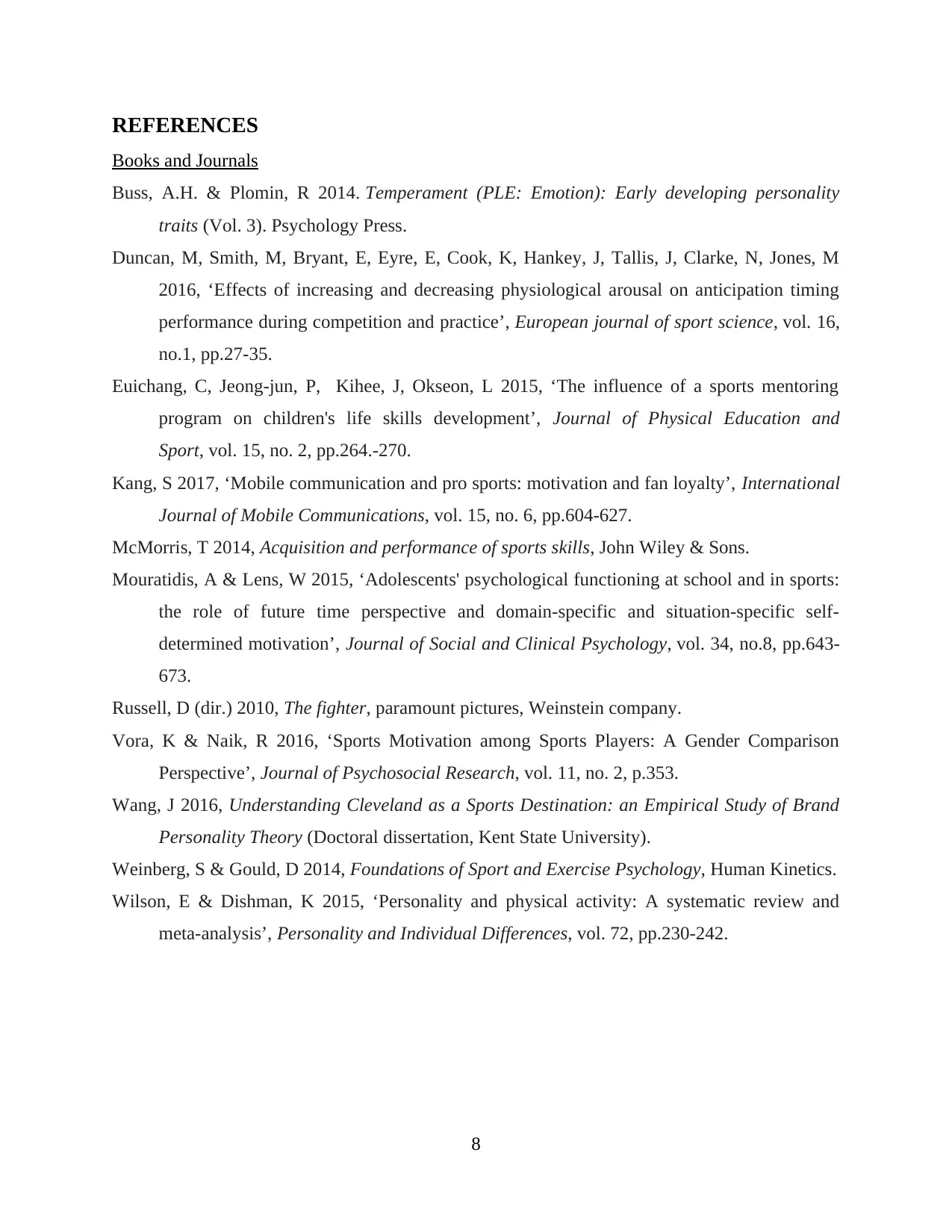
REFERENCES
Books and Journals
Buss, A.H. & Plomin, R 2014. Temperament (PLE: Emotion): Early developing personality
traits (Vol. 3). Psychology Press.
Duncan, M, Smith, M, Bryant, E, Eyre, E, Cook, K, Hankey, J, Tallis, J, Clarke, N, Jones, M
2016, ‘Effects of increasing and decreasing physiological arousal on anticipation timing
performance during competition and practice’, European journal of sport science, vol. 16,
no.1, pp.27-35.
Euichang, C, Jeong-jun, P, Kihee, J, Okseon, L 2015, ‘The influence of a sports mentoring
program on children's life skills development’, Journal of Physical Education and
Sport, vol. 15, no. 2, pp.264.-270.
Kang, S 2017, ‘Mobile communication and pro sports: motivation and fan loyalty’, International
Journal of Mobile Communications, vol. 15, no. 6, pp.604-627.
McMorris, T 2014, Acquisition and performance of sports skills, John Wiley & Sons.
Mouratidis, A & Lens, W 2015, ‘Adolescents' psychological functioning at school and in sports:
the role of future time perspective and domain-specific and situation-specific self-
determined motivation’, Journal of Social and Clinical Psychology, vol. 34, no.8, pp.643-
673.
Russell, D (dir.) 2010, The fighter, paramount pictures, Weinstein company.
Vora, K & Naik, R 2016, ‘Sports Motivation among Sports Players: A Gender Comparison
Perspective’, Journal of Psychosocial Research, vol. 11, no. 2, p.353.
Wang, J 2016, Understanding Cleveland as a Sports Destination: an Empirical Study of Brand
Personality Theory (Doctoral dissertation, Kent State University).
Weinberg, S & Gould, D 2014, Foundations of Sport and Exercise Psychology, Human Kinetics.
Wilson, E & Dishman, K 2015, ‘Personality and physical activity: A systematic review and
meta-analysis’, Personality and Individual Differences, vol. 72, pp.230-242.
8
Books and Journals
Buss, A.H. & Plomin, R 2014. Temperament (PLE: Emotion): Early developing personality
traits (Vol. 3). Psychology Press.
Duncan, M, Smith, M, Bryant, E, Eyre, E, Cook, K, Hankey, J, Tallis, J, Clarke, N, Jones, M
2016, ‘Effects of increasing and decreasing physiological arousal on anticipation timing
performance during competition and practice’, European journal of sport science, vol. 16,
no.1, pp.27-35.
Euichang, C, Jeong-jun, P, Kihee, J, Okseon, L 2015, ‘The influence of a sports mentoring
program on children's life skills development’, Journal of Physical Education and
Sport, vol. 15, no. 2, pp.264.-270.
Kang, S 2017, ‘Mobile communication and pro sports: motivation and fan loyalty’, International
Journal of Mobile Communications, vol. 15, no. 6, pp.604-627.
McMorris, T 2014, Acquisition and performance of sports skills, John Wiley & Sons.
Mouratidis, A & Lens, W 2015, ‘Adolescents' psychological functioning at school and in sports:
the role of future time perspective and domain-specific and situation-specific self-
determined motivation’, Journal of Social and Clinical Psychology, vol. 34, no.8, pp.643-
673.
Russell, D (dir.) 2010, The fighter, paramount pictures, Weinstein company.
Vora, K & Naik, R 2016, ‘Sports Motivation among Sports Players: A Gender Comparison
Perspective’, Journal of Psychosocial Research, vol. 11, no. 2, p.353.
Wang, J 2016, Understanding Cleveland as a Sports Destination: an Empirical Study of Brand
Personality Theory (Doctoral dissertation, Kent State University).
Weinberg, S & Gould, D 2014, Foundations of Sport and Exercise Psychology, Human Kinetics.
Wilson, E & Dishman, K 2015, ‘Personality and physical activity: A systematic review and
meta-analysis’, Personality and Individual Differences, vol. 72, pp.230-242.
8
Paraphrase This Document
Need a fresh take? Get an instant paraphrase of this document with our AI Paraphraser

9
1 out of 11
Your All-in-One AI-Powered Toolkit for Academic Success.
+13062052269
info@desklib.com
Available 24*7 on WhatsApp / Email
![[object Object]](/_next/static/media/star-bottom.7253800d.svg)
Unlock your academic potential
Copyright © 2020–2025 A2Z Services. All Rights Reserved. Developed and managed by ZUCOL.